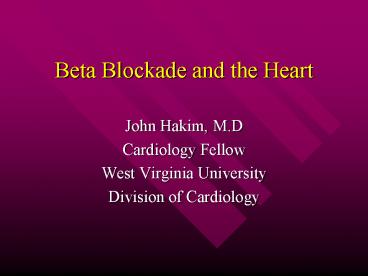Beta Blockade and the Heart PowerPoint PPT Presentation
1 / 14
Title: Beta Blockade and the Heart
1
Beta Blockade and the Heart
- John Hakim, M.D
- Cardiology Fellow
- West Virginia University
- Division of Cardiology
2
Beta Blocker Heart Attack Trial
- Randomized 4000 Patients to Placebo Vs.
Propranolol - 20 Reduction in Mortality in Propranolol group
- Despite a 17 rise in Triglycerides and a 6 rise
in LDL
3
Beta Blockers in ACUTE MI
- Beta Blockers Reduce pain, and reduce need for
analgesics presumably by reducing ischemia - Most useful in patients with sinus tachycardia
and HTN post MI
4
Beta Blockers in ACUTE MIProtocol (Braunwald)
- Exclude patients with Heart Failure (10 cm rales
above diaphragm), hypotension lt90mmHG,
Bradycardia lt60 bpm, and Heart Block. - Metoprolol in three 5mg boluses q 5 min
- Stop if HR lt60 or SBP lt100mmHg
- If stable, give oral metoprolol 50mg q6h x 2 days
- Then switch to 100mg BID or Toprol XL (IV
esmolol useful in patient with relative
contraindication.)
5
What not to give Post Acute MI
- Unlike Beta Blockers, calcium antagonists are of
little value in AMI and may, in fact, be
hazardous.
6
Effects of Beta Blockers Post MI
- Immediate reduces cardiac index, heart rate and
blood pressure. Net effect is to reduce
myocardial oxygen consumption/minute/beat.
(Reduces Chest Pain) - Reduces infarct Size in Acute MI
- Diminishes circulating levels of free fatty acids
by antagonizing lipolytic effects of
catecholamines. (FFA augment O2 consumption and
increases incidence of arryhthmias.
7
Effects of Beta Blockers Post MI(Pre-Thrombolytic
Era)
- ISIS-1
- 16,000 patients randomized
- reduction of mortality among patients randomized
to IV atenolol Vs. placebo. - Meta analysis of 27 trials (27,000 patients) IV
followed by oral beta blockers - 15 relative reduction in mortality, non fatal
reinfarction, and nonfatal cardiac arrest
8
Effects of Beta Blockers Post MI
- TIMI-II trial (Thrombolytics in MI)
- Recurrent ischemia and reinfarction were reduced
by immediate vs. delayed use of metoprolol. - mortality and LV function were not improved by
immediate metoprolol. - Therefore beta-blockers are beneficial, but may
not enhance the salvage of myocardium due to
early reperfusion.
9
Effects of Beta Blockers Post MICurrent
Recommendations
- Patients with hyperdynamic state ( sinus
tachycardia, HTN, no CHF or bronchospasm, no
heart block) - Patients seen in the first 4 hours of their MI
- Regardless of whether thrombolytics are used
- Beta-Blockers indicated for people with
persistent or recurrent ischemic pain
10
Beta Blockers and Idiopathic Dilated
Cardiomyopathy
- Chronic Beta-Blockers increase the number of Beta
adrenergic receptors on the Heart - Reduced ischemia and more efficient oxygen
utilization (Study done w/ metoprolol) - Detectable improvement in Cardiac Output (and EF)
after three months. - Long term structural changes of decline in LV
volume and Mass after 12-18 months.
11
Other Beta Blocker Indications
- Arrhythmias associated withthyrotoxicosis,
pheochromocytoma - excess catecholamine state.
- Arrhythmias initiated by excercise or emotion
often respond to propranolol - Metoprolol may be helpful in controlling rate of
multifocal atrial tachycardia
12
Question
- Peri-operative myocardial ischemia is the single
most important reversible risk factor for
mortality and cardiovascular complications
annually. - Is there any way to prevent perioperative
myocardial ischemia during non cardiac therapy?
13
Perioperative Cardiovascular Morbidity and
Mortality
- In patients who are at risk for coronary artery
disease who must undergo non-cardiac surgery,
treatment with atenolol during hospitalization
can reduce mortality and the incidence of
cardiovascular complications for as long as 2
years after surgery. (N Eng J Med
19963351713-20)
14
Perioperative Cardiovascular Morbidity and
Mortality
- In patients with CAD standard practice is to
control heart rate pre-op and intra-op. - Post-op tachycardia may precipitate ischemia
- Beta-blockade can modulate the post-op
sympathetic response. - Preventing ischemia prevents morbidity and
mortality.

